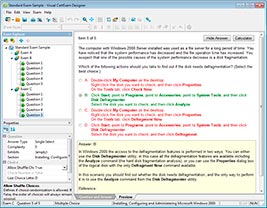Download Juniper Networks Certified Associate Junos (JNCIA-Junos).JN0-102.Prep4Sure.2019-04-15.253q.vcex
| Vendor: | Juniper |
| Exam Code: | JN0-102 |
| Exam Name: | Juniper Networks Certified Associate Junos (JNCIA-Junos) |
| Date: | Apr 15, 2019 |
| File Size: | 925 KB |
How to open VCEX files?
Files with VCEX extension can be opened by ProfExam Simulator.
Discount: 20%
Demo Questions
Question 1
The IP address 10.1.1.1 belongs to which class of IP address space?
- Class A
- Class B
- Class C
- Class D
Correct answer: A
Question 2
What is a valid IPv6 address?
- 00:05:85:23:45:67
- 127.0.0.1
- 2001:0db8:3000:2215:0000:0000:aaaa:1111
- 49.0001.0192.0168.1001.00
Correct answer: C
Question 3
At which layer of the OSI model does error checking occur with IPv6?
- Layer 2
- Layer 3
- Layer 4
- Layer 7
Correct answer: C
Question 4
Which statement is correct regarding IPv6 addresses?
- An IPv6 address consists of 128 bits separated into eight 16-bit hexadecimal sections.
- An IPv6 address consists of 64 bits separated into four 16-bit hexadecimal sections.
- An IPv6 address consists of 128 bits separated into sixteen 8-bit hexadecimal sections.
- An IPv6 address consists of 64 bits separated into eight 8-bit hexadecimal sections.
Correct answer: A
Question 5
Which two statements about MPLS label-switched paths (LSPs) are true? (Choose two.)
- LSPs are bidirectional.
- LSPs are unidirectional.
- LSPs must follow the IGP's shortest path.
- LSPs can follow paths other than the IGP's shortest path.
Correct answer: BD
Question 6
What are two ways that packet fragmentation is handled differently between IPv6 and IPv4? (Choose two.)
- End hosts determine the path MTU for IPv6.
- End hosts determine the path MTU for IPv4.
- Packet fragmentation occurs at intermediate nodes for IPv4.
- Packet fragmentation occurs at intermediate nodes for IPv6.
Correct answer: AC
Question 7
-- Exhibit --
user@router> show route protocol static
inet.0: 15 destinations, 15 routes (15 active, 0 holddown, 0 hidden)
+ = Active Route, - = Last Active, * = Both
99.0.0.0/17 *[Static/5] 00:00:11
>to 10.1.1.2 via ge-0/0/1.0
99.0.0.0/19 *[Static/5] 00:00:11
>to 10.1.2.2 via ge-0/0/2.0
99.0.0.0/24 *[Static/5] 00:00:11
>to 10.1.3.2 via ge-0/0/3.0
99.0.0.0/26 *[Static/5] 00:00:11
>to 10.1.4.2 via ge-0/0/4.0
-- Exhibit --
In the exhibit, there are four static routes that route traffic through different interfaces.
Which interface does the router use if traffic is sent to the 99.0.0.1 destination?
- ge-0/0/1
- ge-0/0/2
- ge-0/0/3
- ge-0/0/4
Correct answer: D
Question 8
What is the binary equivalent of 242.168.94.124?
- 11110011 10101000 01011110 01111100
- 11110010 10101010 01011110 01111100
- 11110010 10101000 01011110 01111100
- 11110010 10101000 01010110 01111100
Correct answer: C
Question 9
What is the network address for the 10.13.147.100/19 host?
- 10.13.128.0
- 10.13.147.0
- 10.13.0.0
- 10.13.100.0
Correct answer: A
Question 10
How many host addresses are available in the 172.27.0.0/28 network?
- 6
- 14
- 28
- 30
Correct answer: B
HOW TO OPEN VCE FILES
Use VCE Exam Simulator to open VCE files

HOW TO OPEN VCEX AND EXAM FILES
Use ProfExam Simulator to open VCEX and EXAM files


ProfExam at a 20% markdown
You have the opportunity to purchase ProfExam at a 20% reduced price
Get Now!



